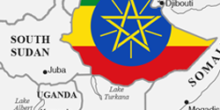A group of civil society organizations are calling for an independent and impartial international investigation into human rights violations in Ethiopia, including the unlawful killing of peaceful protesters and a recent spate of arrests of civil society members documenting this crackdown.
DefendDefenders (East and Horn of African Human Rights Defenders Project), the Association for Human Rights in Ethiopia (AHRE), Amnesty International, the Ethiopia Human Rights Project (EHRP), Front Line Defenders, and the International Federation for Human Rights (FIDH), are concerned about the levels of persecution and detention of civil society members in the country. Since last month, four members of one of Ethiopia’s most prominent human rights organizations, the Human Rights Council (HRCO), were arrested and detained in the Amhara and Oromia regions. HRCO believes these arrests are related to the members’ monitoring and documentation of the crackdown of on-going protests in these regions.
On 14 August, authorities arrested Tesfa Burayu, Chairperson of HRCO’s West Ethiopian Regional Executive Committee at his home in Nekemte, Oromia. Tesfa, who had been monitoring the protests for the organization, was denied access to his family and his lawyer, and released on 16 August without charge. Two days earlier on 12 August, Abebe Wakene, also a member of HRCO, was arrested and taken to the Diga district police station in Oromia. Abebe Wakene remains in detention with no formal charges against him. In addition, on 13 August, Tesfaye Takele, a human rights monitor in the Amhara region, was arrested in the North Wollo zone and is still detained without charge.
On 8 July, Bulti Tesema – another active member of HRCO – was arrested in Nejo, Oromia. He had been working with HRCO to monitor and document violent repression of the protests. Sources told DefendDefenders that his whereabouts remained unknown for several weeks after his arrest, until they found out that he had been transferred to the capital’s Kilinto prison and charged with terrorist offences. He has not been given access to either his family or his lawyer. The court has adjourned the hearing to 12 October.
“New levels of violence are being reported in the crackdown on the largely peaceful protests that have taken place across Oromia and Amhara regions in recent weeks,” said Hassan Shire, Executive Director of DefendDefenders. “Instead of investigating and holding accountable those responsible for rights violations, the government is jailing the few independent human rights defenders left working in the country.”
HRCO’s human rights monitors were arrested for attempting to document the large-scale pro-democracy protests and the following violent crackdown by the authorities in the Oromia and Amhara regions, as well as in the capital Addis Ababa on 6 and 7 August. Amnesty International reported that close to 100 protesters were killed and scores more arrested during the largely peaceful protests.
Three journalists were also arrested and detained by Ethiopian security officials for 24 hours on 8 August 2016 in the Shashemene area of the Oromo region. According to the Foreign Correspondents’ Association of Ethiopia, Hadra Ahmed, a correspondent with Africa News Agency, was arrested along with Public Broadcasting Services (PBS) reporters Fred de Sam Lazaro and Thomas Adair, despite having proper accreditation. They were reporting on the government’s response to the drought in the Oromia region, where protests have been ongoing since November 2015. Their passports and equipment were confiscated and they were forced to return to Addis Ababa.
“Despite the systematic repression of peaceful protestors, political dissents, journalists and human rights defenders, the absence of efficient and effective grievance redress mechanisms risks plunging the country into further turmoil,” said Yared Hailemariam, Executive Director of AHRE.
In response to the on-going crackdown, the UN High Commissioner for Human Rights, Zeid Ra’ad Al Hussein, has called for “access for independent observers to the country to assess the human rights situation”. Ethiopia’s government, however, has rejected the call and promised to launch its own investigation.
Ethiopia’s National Human Rights Commission, which has the mandate to investigate rights violations in Ethiopia, has failed to make public its own June report on the Oromo protests, while concluding in its oral report to Parliament that the lethal force used by security forces in Oromia was proportionate to the risk they faced from the protesters. Since November 2015, at least 500 demonstrators have been killed and thousands of others arrested in largely peaceful protests in the Oromia and Amhara regions and other locations across the country.
“The lack of independent and transparent investigation of human rights violations in Ethiopia strongly implies that the Ethiopian government’s investigation of the ongoing human rights crisis will not be independent, impartial and transparent,” said Sarah Jackson, Amnesty International’s Deputy Regional Director for East Africa, the Horn and the Great Lakes. “It is time to step up efforts for an international and independent investigation in Ethiopia.”
DefendDefenders, AHRE, Amnesty International, EHRP, Front Line Defenders, and FIDH urge the Ethiopian authorities to (i) immediately and unconditionally release civil society members targeted for their work and (ii) facilitate access for international human rights monitoring bodies including the Office of the High Commissioner for Human Rights (OHCHR) to conduct thorough, independent, impartial and transparent investigations into the ongoing human rights violations in the Oromia, Amhara and Addis Ababa areas.
For further information, please contact:
Hassan Shire
Executive Director, East and Horn of Africa Human Rights Defenders Project
[email protected] or +256 772 753 753
Clementine de Montjoye
Advocacy & Research Officer, East & Horn of Africa Human Rights Defenders Project
on [email protected] or +256 752 183 305
Yared Hailemariam
Executive Director, Association for Human Rights in Ethiopia
on [email protected] or +32 486 336 367
Seif Magango
Media Manager – East Africa, Amnesty International
on [email protected] or +254 788 343 897

